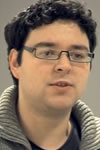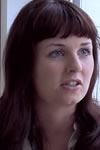Ask me a question!
What were the main 'career decision' milestones in your life so far?
Within school, my tendency was toward the more technical subjects such as physics and chemistry. This direction continued when deciding what third level course to do. I chose Applied Physics for university and in hindsight that was probably the major juncture in my career path. It afforded me the opportunity to gain a broad range of skills and opened a wide spectrum of job options.
Within the corporation itself, a major milestone was the decision to go on relocation to the US headquarters on a two year trip. That really raised the bar and opened another world of opportunity. Through the years here with my current employer I have always opted to pursue the technical path rather than diverge into a managerial role; something which my employer has thankfully supported and accommodated.
Who are the people who most influenced your career direction?
Within school I was mostly self directed but with a strong focus on science and technical areas. A person of influence at this stage was James Gleick (author of the book: Chaos) who's books were exciting and accessible.
Within university I was influenced by the lecturers who, with their high degree of competency and depth of knowledge really gave me inspiring heights to strive for. Within work after university, my peers and friends would have been my main influences.
How did you go about getting your current job?
I had won a scholarship from Intel in 1997 which subsidised my remaining university years, so after finishing in there in 1999 it was a pretty quick migration to the corporation here.
As I recall, I finished my last university exam on a Thursday and started work here on the following Monday. There were interviews naturally and the standard process was adhered to, I just scheduled them neatly. After passing the entrance interviews etc. the next step was to find a particular role which best suited my skills, which led to a system administrator role: managing an array of computers which controlled a respective set of tools in the factory. The position in my current job is the result of a number of smaller transitions/promotions from there.
Describe a typical day?
Arrive in and check my inbox for any major issues which demand instant attention. Usually there are no surprises but the plant runs 24 hours a day so sometimes issues can crop up at 3am and they would be queued there for me in the morning.
The priorities are set at a number of levels (weekly, and quarterly for example) so I have a reasonably good idea of what to expect for the upcoming day however if issues arise they may become the highest priority and take over for that day. My calendar for the day will contain my day's scheduled meetings so I can see where I am committed to being at certain times (handily synchronised with my mobile phone so I don't miss any of them).
A sample project that I might be working on in a given day may be a programming project for a middleware application. As part of a larger group my efforts will be in concert with the other programmers so there may be a meeting with these peers. Currently I am working in union with a group of programmers in Israel (where we have another campus) and they are 2 hours ahead of GMT so am more likely to have a voice conference at my desk early in the day with them to discuss the issues of the day (such as requirements definitions or the specifics of a program. Then it might be a period of programming or testing from my cubicle before lunch. Lunch would be at the partially subsidised canteen where there is a broad selection available.
After lunch I may be involved with the installation or configuration of a computer attached to a factory tool so that may require visiting the factory floor for a while. (I work in an area which is not in the bunny-suit arena, so I wouldn't normally don those layers of clothes). At the tool we may install or test out a new suite of software and possible debug issues arising from that. In the evening I may be involved in a meeting with the US teams (who are 8 hours behind GMT) so that would only really start at 4pm. Such a meeting may be to synchronise with that team to confirm that we are running the factory in exactly the same way or discuss future changes) For the programming tasks, the timescales are longer (of the order of 6 months), but the day-to-day sustaining of the Ireland factory is on much shorter timescales and as such priorities can change quicker.
What are the main tasks and responsibilities?
As I span two roles currently I have one selection of roles which pertain to the sustaining aspect of the Sort Department here. These would entail maintaining software on the automated machinery and dealing with technical issues. The aim is always to automate tasks to the highest level and maintain integrity in the processes at all times so I would be responsible for maintaining lock-step with my counterparts around the sites worldwide.
This may entail installing or configuring software. My second role is to contribute to a programming team which is working to build a middleware suite of software which will efficiently act to control the automated hardware in the factory. in this role I would be involved in the full software development lifecycle, seeing the software from initial requirements gathering to final release and installation of the software in the factory.
What are the main challenges?
Keeping abreast of all the changes is a major challenge. There are so many bright people all working away on their topics and changing the game so often that it is essential to keep abreast of your peers work. Go on holidays for two weeks and it could take another week just to catch up with everything. The technical challenges I experience here are often involved with the intricacies of minor details in operating systems, networking protocols or programming. Staying on top of the game involves continually keeping track of what are the trends and technologies outside the corporation too. e.g. subscribing to blogs to stay informed of trends in the processor industry.
What do you like most?
I spend much of my time building and controlling some seriously powerful computers, way beyond what PCs are capable of. I get to work with hardware sometimes worth upwards of a million euro. I get to work as part of a team that are producing stuff worth literally billions of euro.
I get to hang out with some of the world's most techy geeks; eg. having lunch with an astrophysicist, a plasma physicist and an ex-systems administrator for the world's most powerful supercomputer (not all at the same time though :-). I sometimes go on expensive business trips to the US or middle-East; and naturally get to spend some holiday time there too.
Is there anything that isn't great?
What particular skills do you bring to your workplace?
A definite interest in all things geek, preferably uber-geek. Even if I wasn't employed here I think I would do much of this stuff, just for fun. I revel in more intractable technical problems and love to find a really succinct solution to a difficult issue. From my official education I brought a range of technical abilities, such as engineering principles, electronics (digital and analog), mathematic basis and programming; but I also brought some real world experience from having dabbled in PC building/programming as a hobby.
What subjects did you take in school and how have these influenced your career path?
In secondary school I took Physics and Chemistry since I loved science. I also took Business Organisation but that was for the life skills it teaches rather than an intrinsic desire. I would gladly have enjoyed doing all the science subjects, to the complete detriment of all others but in hind-sight I am glad I took a subject such as Biz. Org. as it gave a rounding aspect to my secondary schooling.
I would have liked to have done Technical Drawing possibly but had to make a choice. I was only mediocre in German and Irish but again am glad I did them for at least secondary school as it challenged me and I did not get too narrowly focused on the technical subjects (there was plenty of time for that in third-level). In hindsight I realise that Maths was more important than I imagined and the two science subjects stood me in good stead. The choices I made for the subject selection was made by my passion for the sciences. Luckily I was afforded this leeway as the points for my intended course were not particularly high at the time.
What is your education to date?
For secondary school I attended St. Muredachs in Mayo, plenty of A's in Junior Cert, but only 1 in Senior Cert (didn't knuckle down properly there), somewhere in the 450 points region.
I only really got the best grades when I got to focus on my chosen topics later in third-level, getting first class honours degrees there. For my Bachelors degree: Applied Physics in DCU (1995 to 1999). I loved that course, it started with a wide spectrum of subject matter, including engineering principles, optical physics, programming and laboratory work, through to more focused topics such as plasma and quantum physics.
While working here I studied at Dublin Institute of Technology (Bolton St. 2004-2006) and did a part time Masters in Applied Computing. This was great since it gave me a more formal framework for my computing. The experiences at work had taught me much of the information which was actually covered in the Masters program, and happily, Intel sponsored my fees for this.
Within work I have completed a number of one-week courses which have been specifically targeted at topics of the day, such as C++ programming or Unix systems administration. Those courses have usually been in Ireland, but some were in Boston, Oregon, Manchester and Israel.
What aspects of your education have proven most important for your job?
What have been the most rewarding events in your career so far?
Creating a program which I designed completely myself and succeeded in transferring huge amounts of data between the US and Irish sites.
Delivering a software package which was used on every instance of a particular fleet of tools in Intel worldwide (and those tools were used to test all the millions of CPUs Intel made for a period of about two years)
What personal qualities do you have that helps you in your career?
Technically minded and inquisitive to know "how things work", the structure/nature of everything and the processes that define the world. I enjoy the humour which can be found and experienced every day in this, which is a relaxed atmosphere. Not particularly ambitious in the traditional political way, but definitely like to day-dream and invoke imagination.
What is your dream job?
To have the financial freedom to create my own lab, with a team of bright cohorts, doing random projects which pique my interest - like James Dyson did.
We would do some contract work for NASA, the NSA, the Bill and Melinda foundation and some global think tanks. We would have a crazy budget and appear on Slashdot every month. We would also have the dream car-park out back, a Lamborghini in every colour.
Does your job allow you to have a lifestyle you are happy with?
Absolutely. The job itself lends itself to a normal 9 to 5 scenario, with the opportunity to delve deep into projects and spend all day on them if so desired. Also, my employer is particularly accepting and accommodating of the work-life balance. Initiatives such as telecommuting and skewed hours are commonplace here so it is possible to define much of your own working patterns (within some limits).
Sabbatical banks are used to great effect in this company too, i.e. where you carry forward a number of days holidays each year for 5 or 7 years and then can take them all in one chunk. Incentives such as this allowed me to go traveling through Australia and South East Asia for three months last year.
The location of the campus is perfect for me. i.e. 20 km west of Dublin, outside the heavy commute region but still within NiteLink range so I can get a 3:30am bus home on a Saturday night. The work-life balance has always been addressed openly here and various services exist to cater for this, such as the on-site gym where I play indoor soccer on a Friday.
What advice would you give to someone considering this job?
Possibly useful qualities/interests:
A predisposition towards technical problems, such as puzzles or machinery. An interest in the nature of how things work, such as the desire to disassemble machinery/gadgetry to unlock its inner workings.
An inventive side; one who uses the parts of other gadgets, to make a new personalised gadget. Interested in high tech gear: gadgetry of all forms.
A capacity to learn processes for oneself e.g. seeing a puzzle solved and then repeating it.
Skills: Technical subjects such as Maths or electronics. Programming is very accessible to anyone with a basic home PC and some internet connection so try it out and see if you like it.
Values: If you value the solving of an intricate, convoluted problem, for it's own sake and find that rewarding, then any engineering job will come easily.
Education: Firm basis in Maths and the sciences. People are hired into engineering positions here from backgrounds such as science and computing primarily.
What are the three most important personal characteristics required for the job?
What is your pet hate at work?
Have you undertaken, or do you plan to undertake any further training as part of your job?
Training is always an ongoing agenda item - we even have it listed as a default priority item in our official schedule here. It may be of the form of online classes, or classes in-house where the company brings in professional trainers/lecturers to give classes and information talks; or it may involve traveling to attend a class specifically tuned to your next objective. For example, my next class is a two day session about digital electronics, which will be pertinent to my current programming project. On average training in some form or other occurs about 3 or 4 times a year.
What kinds of work experience would provide a good background for this position?
Work in a manufacturing setup. e.g. a local factory, which most likely will have clearly defined manufacturing processes in place, and see how the adherence to proper procedures can result in great quality products. e.g. I worked in a wooden truss mill (making the timber roof frames for houses)and learnt a lot about the factory mind-set. If you get to learn about the process they use in their manufacture, maybe you can spot how it could be bettered (present the fully formed idea to the boss as your idea and maybe you'll get a raise).
Work somewhere that has a clear team structure, and learn from how that structuring works. e.g. if you are working as part of a team of 5 mowing grass on a golf course, see how the task is impossible for 1 but achievable by many working in a concerted effort. (also see if you can better that process, maybe by more complicated mow patterns).
Outside of work experience, you can do some personal items such as: building your own website(s). it could be a personal blog (myspace and its ilk do not count :-) or a website for your local sports team. Extra points if you secure an ie domain name. Maybe that can become a small business in itself?
Write your own program which accomplishes some task. The task can be trivial or just for fun, but set a goal and make it happen. Eg. write a program to solve a 9*9 sodoku.
- Career Development?
- Current Job?
- Education and Training?
- Personal Qualities?
- Advice for Others?








